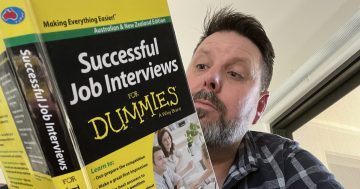Nick Deligiannis* says knowing for to discuss your CV effectively can be the difference between a job offer and winding up int the ‘do not call’ pile.
 For all the innovation and technology that has revolutionised the process of getting a job in recent years, there is one thing that has never changed.
For all the innovation and technology that has revolutionised the process of getting a job in recent years, there is one thing that has never changed.
You can still pretty much guarantee that at some point in the interview you’ll be asked the standard question that interviewers have asked job-seekers since dawn of time.
When an interviewer asks you to talk them through your CV, what they are really asking you to do is bring the black and white document in front of them to life by explaining which experiences in your work history prove that you are suitable for the role they are hiring for.
They are also looking for the skeletons in your closet that will place you in the ‘do not call’ pile.
Given that the remit this question hands you is so far reaching, especially if you are a more experienced candidate, it can be hard to know where to start, which points to highlight and how to keep the interviewers attention.
So, plan how you will talk through your CV in an interview; if you get it right you will communicate the skills and experience that reflect your suitability for the role, provide the interviewer with the information that they need to make a decision, and ultimately, get the interview off to the best start possible.
Where to begin your story
Firstly, you should talk through your CV in chronological order.
That way you will tell a coherent and positive story of development.
In most cases, this would mean from your last place of higher education such as university, to the jobs listed on your CV to the present day.
Remember to check your CV aligns with your online professional profiles such as LinkedIn before the interview.
The hiring manager will have researched both, and may pull you up on any inconsistencies between the two.
Tell a story as you talk through all of your experience, especially those jobs that were a long time ago, or for a short duration.
Explain how each role led you to the next, and until you arrive at your current situation, and how it led you to this interview.
Decide which areas of your CV to focus on
Certain parts of your education and experience will be more relevant than others to the job you are applying for.
Before the interview, highlight the areas of education and professional experience which match the job description.
Everything left un-highlighted, doesn’t warrant as much focus.
For instance, you may have spent three years studying geography at university, and since then you had a position as a retail assistant for a year, before working as a PA for two years.
Now you are applying for an executive PA role, therefore you would devote more time to talking about your PA experience.
That’s not to say you should avoid the other parts of your CV altogether.
The parts of your CV to skim over
The areas of your experience that aren’t as relevant to the role in question, so in the above case, your role as a retail assistant, will still need a mention.
Skipping over these parts could be misinterpreted as you trying to gloss over something, simply give a headline overview of your job title, and how you got to this position.
For example:
“After graduating with a distinction in Geography, and unsure of which career path to take, I chose a role which would help me to develop a broad range of experience and transferable skills.
“I knew I enjoyed contact with people, and an agency offered me a role as a retail assistant – that seemed like a useful starting point for me.”
The parts of your CV you want to emphasise
As you talk through the professional experience that you do wish to highlight, so in this case, your experience as a PA, give a brief overview of your role and the responsibilities which relate to the role you are applying for.
You won’t need to go into great detail about your skills and key achievements here as there will be plenty of time for this throughout the rest of the interview, especially when asked competency based questions.
Simply highlight how you ended up in this role, your key responsibilities which relate to opportunity, and why you chose/are choosing to move on.
For instance:
“After a year of working as a retail assistant, I reflected upon the parts of my role that I enjoyed the most, which included the multitasking and organisational tasks.
“Therefore I decided to pursue a role which allowed me to do more of what I enjoyed on a daily basis, and joined my current employer as a PA.
“My responsibilities here include data managing and filing, taking meeting minutes and co-ordinating events and people’s diaries.
“After two years at this company, however, I have decided that I am now ready for the next challenge, and want to take on a role which offers a greater level of responsibility and accountability for one person’s affairs: for instance managing a senior executive’s diary, co-ordinating their appointments and organising their correspondence.
“That’s why I am so excited to be interviewing for this role today.”
Explaining gaps on your CV
You will also need to prepare to talk through any gaps on your CV.
Again, you don’t need to go into lots of detail here, but if there is an employment gap of three months or more, you should at least explain what you were doing during this time.
Career breaks are fine, as long as you can talk to the interviewer about how you kept yourself busy, whether you were studying, had family commitments, or went travelling, for instance:
“In between my role at X and Y, I decided I wanted to go travelling in order to build up my cultural awareness and increase my independence.
“Therefore, I went backpacking around South East Asia for three months.”
The fact that talking through a CV is a permanent fixture in job searches doesn’t mean that people generally do it very well.
On the contrary, since people feel that it’s the easiest interview question to answer (“I know that bit, I remember it – I was there!”) it is often overlooked when preparing for an interview.
That homework is critical – planning what to focus on, how to describe it and adapting your style and focus according to the company and role you are interviewing for.
This part of the interview can either make for a rocky start, or a great one, depending on how well you prepare.
If you plan in advance how to tell your story, and which parts of your story to emphasise, you provide the interviewer with a concise, cohesive rundown of your background, setting a positive tone for the rest of the interview.
*Nick Deligiannis is Managing Director of Hays Australia and New Zealand.
This article first appeared at hays.com.au.











